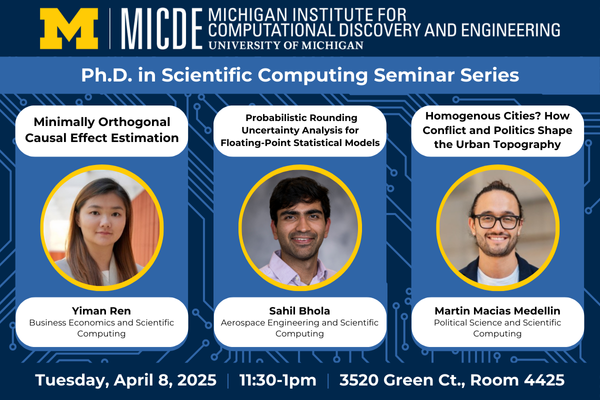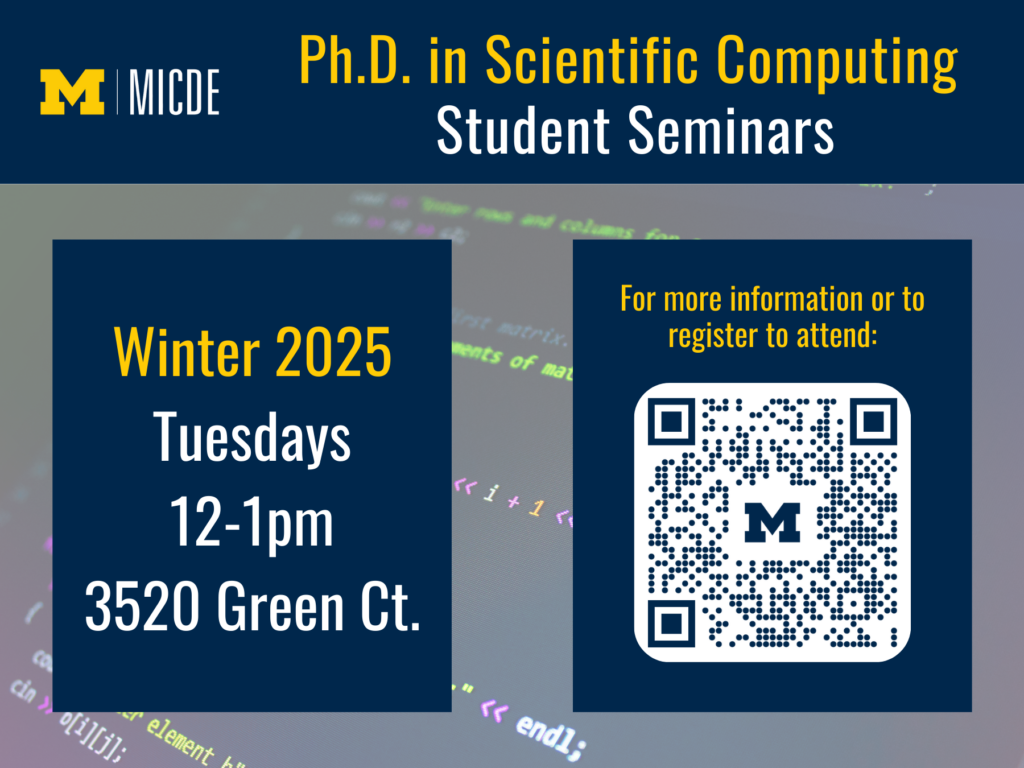Events

- This event has passed.
Ph.D Seminar: Matthew Duschenes & Yi Zhu
February 18, 2021 @ 4:00 pm - 5:00 pm
Venue: Zoom Event
MATTHEW DUSCHENES, GRADUATE STUDENT, APPLIED PHYSICS & SCIENTIFIC COMPUTING
 Bio: I am in my third year of the Applied Physics & Scientific Computing Ph.D. programs, after completing a master’s in theoretical physics in my home country of Canada. As a member of Dr. Krishna Garikipati’s Computational Physics group, I am currently working on data driven modelling and am collaborating with several groups on applying these graph theoretic approaches to various systems of interest.
Bio: I am in my third year of the Applied Physics & Scientific Computing Ph.D. programs, after completing a master’s in theoretical physics in my home country of Canada. As a member of Dr. Krishna Garikipati’s Computational Physics group, I am currently working on data driven modelling and am collaborating with several groups on applying these graph theoretic approaches to various systems of interest.
GRAPH THEORETIC APPROACHES FOR PHYSICAL SYSTEMS: Numerical analyses of physical systems are conventionally performed using direct numerical simulations, that have proven highly successful, yielding high fidelity solutions to very high dimensional problems, such as boundary value problems with upwards of tens of millions of degrees of freedom. However, there is always a balance to be met between the desire for higher accuracy and additional physics to be modeled, and the complexity, interpret-ability and ease of representation of such solutions. To aid in this dilemma, I will be introducing a novel graph theoretic approach, allowing for lower dimensional, reduced order models to be produced, given small amounts of high fidelity data. In this talk I will explain how such an approach allows for an intuitive representation of the states of a systems, and how it is possible to use a non-local calculus, allowing for rigorous operators and equations to be defined on the graph. I will then be discussing some implementation details, and convey the generality, validity, and future applications of this framework through some example results from collaborations.
YI ZHU, GRADUATE STUDENT, CIVIL AND ENVIRONMENTAL ENGINEERING & SCIENTIFIC COMPUTING

Bio: Yi is a 3rd year PhD candidate in Civil and Environmental Engineering & Scientific Computation. His research focuses on simulation, design, and fabrication of active origami systems for engineering devices, and is particularly focused on micro-scale shape morphing systems inspired by origami.
SIMULATION AND DESIGN OF MICRO-ORIGAMI SYSTEMS: In this talk, we will introduce some recent advancement in the simulation and the design of micro-origami systems. We will discuss the micro-origami structures we fabricated and the rapid simulation framework we developed to capture the behaviors of these active origami. We will focus on the simulation framework and demonstrate how we can capture the thermo-mechanically coupled folding behavior and contacts between origami panels effectively and rapidly. Finally, we will introduce some ongoing work on extracting origami design principle with interpretable machine learning, which demonstrates how we can use the simulation framework to create better origami design.
This event is part of MICDE’s Winter 2021 seminar series featuring Ph.D. students in the Scientific Computing program. This series is open to all. University of Michigan faculty and students interested in computational and data sciences are encouraged to attend.
Questions? Email MICDE-events@umich.edu


